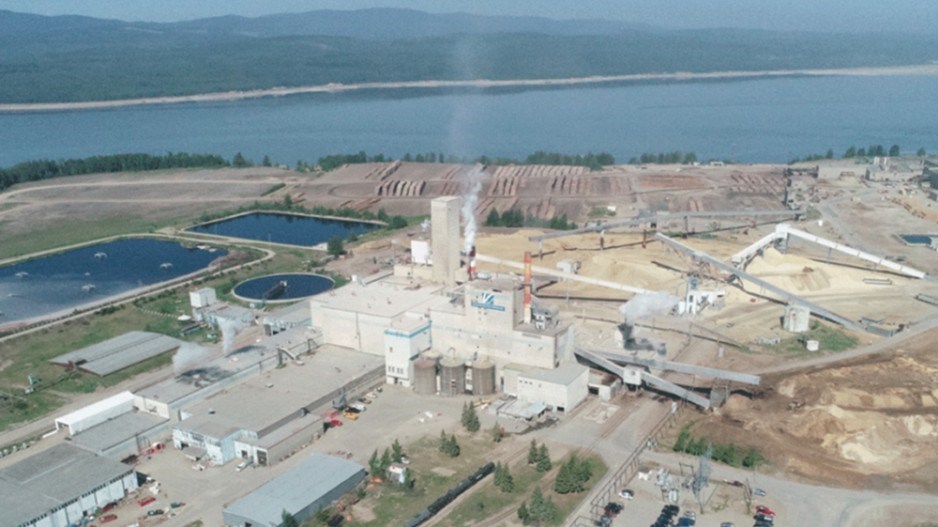Even before a series of atmospheric rivers started pounding B.C. with record-breaking rainfall in mid-November, cutting highways and rail lines, Paper Excellence was forced to curtail production at its pulp and paper mill in Crofton.
That temporary cutback followed the permanent closure of its pulp mill in Mackenzie in mid-2020. On November 18, Paper Excellence announced another temporary curtailment at its Catalyst mill in Powell River and warned customers that they could expect shipments to be late. While the company said last week it planned to restart the Crofton mill, the Powell River mill remains shut down indefinitely.
The mill’s indefinite shuttering may have more to do with declining paper markets than with supply chain issues, however.
The company had been struggling with supply chain bottlenecks that resulted from a global pandemic before recent flooding threw another spanner into the complex network that maintains the flow of goods around the world by ship, train and truck.
“Severe challenges with local and global supply chain congestion exacerbated by B.C.’s recent atmospheric river event have caused significant paper inventory and movement problems for the company,” the company said.
Paper Excellence was also expecting production interruptions for about four weeks in the delivery of forest fibre from sawmills.
Other resource exporters in B.C. have also experienced supply chain problems that could affect their bottom lines.
West Fraser Timber announced last week it was reducing operations at all of its western Canadian locations due to a backlog in lumber and pulp exports. In the second half of November, the company’s weekly lumber shipments dropped 25% to 30%, and pulp shipments through the Port of Vancouver were at just 20% of normal volumes.
For the same reason, Canfor Pulp followed suit a few days later when it said production will be reduced at the Northwood pulp mill for at least two weeks and at the Taylor pulp mill for at least four weeks.
Susan Yurkovich, president and CEO of the BC Council of Forest Industries (COFI), said the impact on lumber exporters will depend on how long supply chain interruptions last.
“We can build inventories for a period of time, but you can only do that for so long,” she said. “If you can’t move your product to market, then you end up in situations where you have to curtail production.
“If it doesn’t get resolved shortly, it will absolutely result in curtailment.”
At the other end of the supply chain, some sawmills could run out of logs in regions hit by flooding – notably the stretch of roads and highways in the Hope-Princeton-Merritt region.
The only mill in Merritt, Aspen Planers, along with other businesses and manufacturers, was shut down “because all their employees are evacuated,” said Todd Chamberlain, general manager of the Interior Logging Association.
Some independent loggers have been seconded to operations helping clear flood debris. Chamberlain said the status of forest service roads isn’t even known yet, so it’s unclear whether there will be problems getting logs to some mills.
“From the contractors’ point of view, there are a lot of unknowns,” Chamberlain said. “While, thankfully, they’re busy concentrating on assisting the communities and trying to get the major access points open … no one’s really had the time or resources to see what it’s done to the resource roads. That’s going to be the next piece of the puzzle: how have the roads been affected out there?
“You think of that whole drainage right from Hope right to Merritt – that’s where the eye of the storm was, so everything off of that is going to be affected. I think, if you drew a line from Princeton right across to Pemberton to Kamloops, all of those areas are going to be impacted for sure.”
As for B.C.’s mining sector, Teck Resources (TSX:TECK.B; NYSE:TECK) reported interruptions of metallurgical coal shipments through the Port of Vancouver. As of November 30, the port reported 13 bulk coal carriers still at anchor waiting for a berth.
The Port of Prince Rupert, however, has remained open and road and rail connections to that port are unaffected by flooding. Teck has diverted some exports through the port’s Ridley Terminals.
“The overall impact and any potential effect on Q4 sales will be dependent on the duration of the logistics chain disruption,” Teck said in a news release.
Despite fears raised by Mining Watch that heavy rainfall could increase the potential for a tailings pond failures at Teck’s Highland Valley Copper operations – and at two decommissioned mine sites – it appears mining operations there and at other mines in B.C. have not been affected.
The Ministry of Energy, Mines and Low Carbon Innovation said there have been no shutdowns of major mining operations in B.C. as a result of flooding, with the exception of some sand, gravel and quarry operations in the Lower Mainland and Fraser Valley.
“Highland Valley Copper continues to operate and has confirmed that TSFs (tailings storage facilities) have adequate capacity to manage flood events and are being continuously monitored by their technical team,” the ministry said. “The rain events of the past week have been within the design capacity for the TSF facilities on the mine.”
As for major energy projects, the Trans Mountain pipeline was shut down November 14, as a precautionary measure, and work on its expansion was halted in areas where flooding occurred. Other major projects like LNG Canada and Site C dam were unaffected.


.jpg;w=120;h=80;mode=crop)